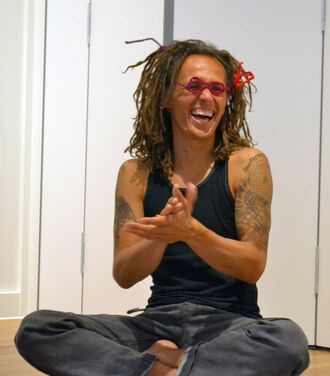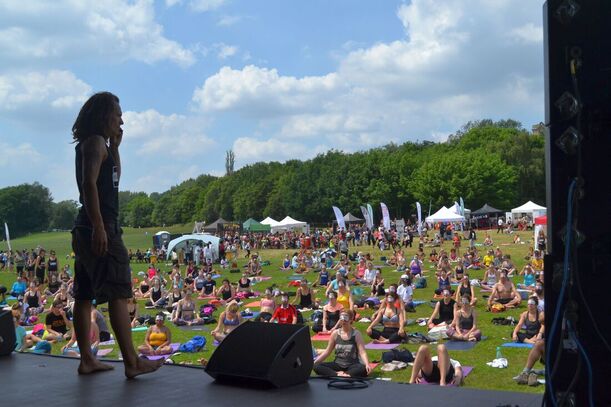
Nothing in the world
is as soft and yielding as water.
Yet for dissolving the hard and inflexible,
nothing can surpass it.
The soft overcomes the hard;
the gentle overcomes the rigid.
Everyone knows this is true,
but few can put it into practice.
-Lao Tzu-
(Tao Te Ching, chapter 78, translation by Stephen Mitchell)
Nothing in the world
is as soft and yielding as water.
Yet for dissolving the hard and inflexible,
nothing can surpass it.
The soft overcomes the hard;
the gentle overcomes the rigid.
Everyone knows this is true,
but few can put it into practice.
-Lao Tzu-
(Tao Te Ching, chapter 78, translation by Stephen Mitchell)
Why Yoga Like Water?
We get asked that a lot.
For one we spend almost as much time in and on the water as we do on land, thats a good reason;
and I grew up loving the philosophy of Bruce Lee and his approach to martial arts; thats another!
Water is magical, it's a contradiction, soft yet powerful, always seeking the lowest places. Unshakeable.
Although we may guess, in reality we don't know why we are here or what our definitive purpose is. Often I don't think that it even matters, there is joy in mystery and discontent in needing to know all the answers.
What we do know is that life is for living, it’s precious and we shouldn’t squander it, of that I'm certain.
We conjure all sorts of stories about ourselves, they are all subjective, we can never really know the truth even about ourselves.
Gemma and I can say that our life has been a non-stop adventure, that’s for sure! Sometimes when I tell people a bit of our story I see them trying to work out if it is actually all possible in the time Im suggesting. From studying medicine and then environmental science; working as an archaeologist; the road protests of the 90's and 2000's; building some of the UK's most cutting edge mechanical art for Arts Council England, Arcadia, Glastonbury Festival and many more. Several years as a school teacher. Moving to a derelict smallholding in rural France and rebuilding it from scratch on our own; living in the very north of Scotland and bringing our children up for five years on a boat.
For someone with life-long battles with anxiety I have constantly pushed my limits.
We have both always preferred to practice on our own than to attend a classes. We are more free to experiment, to move at our own pace and to really feel what is needed mentally and physically on a day to day basis.
It has always seemed perfectly normal to infuse asana practice with natural movement patterns from the rest of life - elements of surfing, kitesurfing and paddleboarding through to martial arts and climbing, all seem to find a way in.
Breathing practice is inspired just as much by my lifelong relationship with asthma and freediving techniques as it is by Russian systema, buteyko and more traditional pranayama practices.
Philosophical musings and meditation draw upon almost any source, from Krishnamurti to Taoism; biohacking and flow state science to Bruce Lee, Patanjali and Buddhism. I think that this has helped me to teach meditation and mindfulness to everyone from billionaires to a group of 150 16 year olds through to 5 year old kids!
Everything has value and you will draw on it at some point. If you cant see the value then you aren't looking hard enough or you are closing yourself off to its potential
We get asked that a lot.
For one we spend almost as much time in and on the water as we do on land, thats a good reason;
and I grew up loving the philosophy of Bruce Lee and his approach to martial arts; thats another!
Water is magical, it's a contradiction, soft yet powerful, always seeking the lowest places. Unshakeable.
Although we may guess, in reality we don't know why we are here or what our definitive purpose is. Often I don't think that it even matters, there is joy in mystery and discontent in needing to know all the answers.
What we do know is that life is for living, it’s precious and we shouldn’t squander it, of that I'm certain.
We conjure all sorts of stories about ourselves, they are all subjective, we can never really know the truth even about ourselves.
Gemma and I can say that our life has been a non-stop adventure, that’s for sure! Sometimes when I tell people a bit of our story I see them trying to work out if it is actually all possible in the time Im suggesting. From studying medicine and then environmental science; working as an archaeologist; the road protests of the 90's and 2000's; building some of the UK's most cutting edge mechanical art for Arts Council England, Arcadia, Glastonbury Festival and many more. Several years as a school teacher. Moving to a derelict smallholding in rural France and rebuilding it from scratch on our own; living in the very north of Scotland and bringing our children up for five years on a boat.
For someone with life-long battles with anxiety I have constantly pushed my limits.
We have both always preferred to practice on our own than to attend a classes. We are more free to experiment, to move at our own pace and to really feel what is needed mentally and physically on a day to day basis.
It has always seemed perfectly normal to infuse asana practice with natural movement patterns from the rest of life - elements of surfing, kitesurfing and paddleboarding through to martial arts and climbing, all seem to find a way in.
Breathing practice is inspired just as much by my lifelong relationship with asthma and freediving techniques as it is by Russian systema, buteyko and more traditional pranayama practices.
Philosophical musings and meditation draw upon almost any source, from Krishnamurti to Taoism; biohacking and flow state science to Bruce Lee, Patanjali and Buddhism. I think that this has helped me to teach meditation and mindfulness to everyone from billionaires to a group of 150 16 year olds through to 5 year old kids!
Everything has value and you will draw on it at some point. If you cant see the value then you aren't looking hard enough or you are closing yourself off to its potential
Over the past 30years of practice and teaching I have shared my understanding with thousands of students, as the meditation teacher at the famous Yeotown retreat to village halls, from gold medal winning olympic athletes and extreme sportspeople to the elderly and immobile ; every age group from 5 to 80 and every walk of life from 'Forbes 100' list personalities to disadvantaged inner city youth groups. Basically whoever we are we all share the same worries, fears, anxieties and misunderstandings about the world
For the past 7 years we have focussed on delivering our Yoga Like Water Teacher Training as well as further teacher training programmes for experienced teachers with a focus on mind based practices from flow state theory to self investigation.
Group classes are mainly online through Movement for Modern Life where I have just completed guiding 20 weeks of live online meditation and philosophy. We run meditation retreats and training at our little hidden place outside of St Agnes Cornwall, surrounded by protected woodland and a nature reserve.
For us there is genuinely no separation between practice and the rest of life. The last thing we want from yoga is to inadvertently put up entirely new walls in a misguided effort to liberate ourselves from other things that we perceive to be trapping us!
Everyones personal journey is all about feeling, about being intuitive, authentic and true to yourself. You can’t take someone else coat and think that it will ever be truly comfortable by squeezing into it. I'd say that we encourage everyone to make their own coats, we don’t want them to try and wear ours but are happy to give them a needle, thread and some fabric if it helps.
No matter what the topic is that we are sharing, the experiential method is the same: self-guided investigation, me doing 40 percent of the work via questioning and the students doing 60 percent themselves by discovering and exploring what they really need for themselves.
You can read interviews and listen to some podcasts with us here
For the past 7 years we have focussed on delivering our Yoga Like Water Teacher Training as well as further teacher training programmes for experienced teachers with a focus on mind based practices from flow state theory to self investigation.
Group classes are mainly online through Movement for Modern Life where I have just completed guiding 20 weeks of live online meditation and philosophy. We run meditation retreats and training at our little hidden place outside of St Agnes Cornwall, surrounded by protected woodland and a nature reserve.
For us there is genuinely no separation between practice and the rest of life. The last thing we want from yoga is to inadvertently put up entirely new walls in a misguided effort to liberate ourselves from other things that we perceive to be trapping us!
Everyones personal journey is all about feeling, about being intuitive, authentic and true to yourself. You can’t take someone else coat and think that it will ever be truly comfortable by squeezing into it. I'd say that we encourage everyone to make their own coats, we don’t want them to try and wear ours but are happy to give them a needle, thread and some fabric if it helps.
No matter what the topic is that we are sharing, the experiential method is the same: self-guided investigation, me doing 40 percent of the work via questioning and the students doing 60 percent themselves by discovering and exploring what they really need for themselves.
You can read interviews and listen to some podcasts with us here

